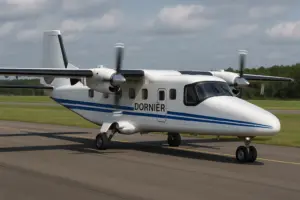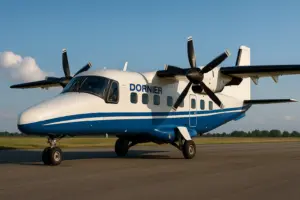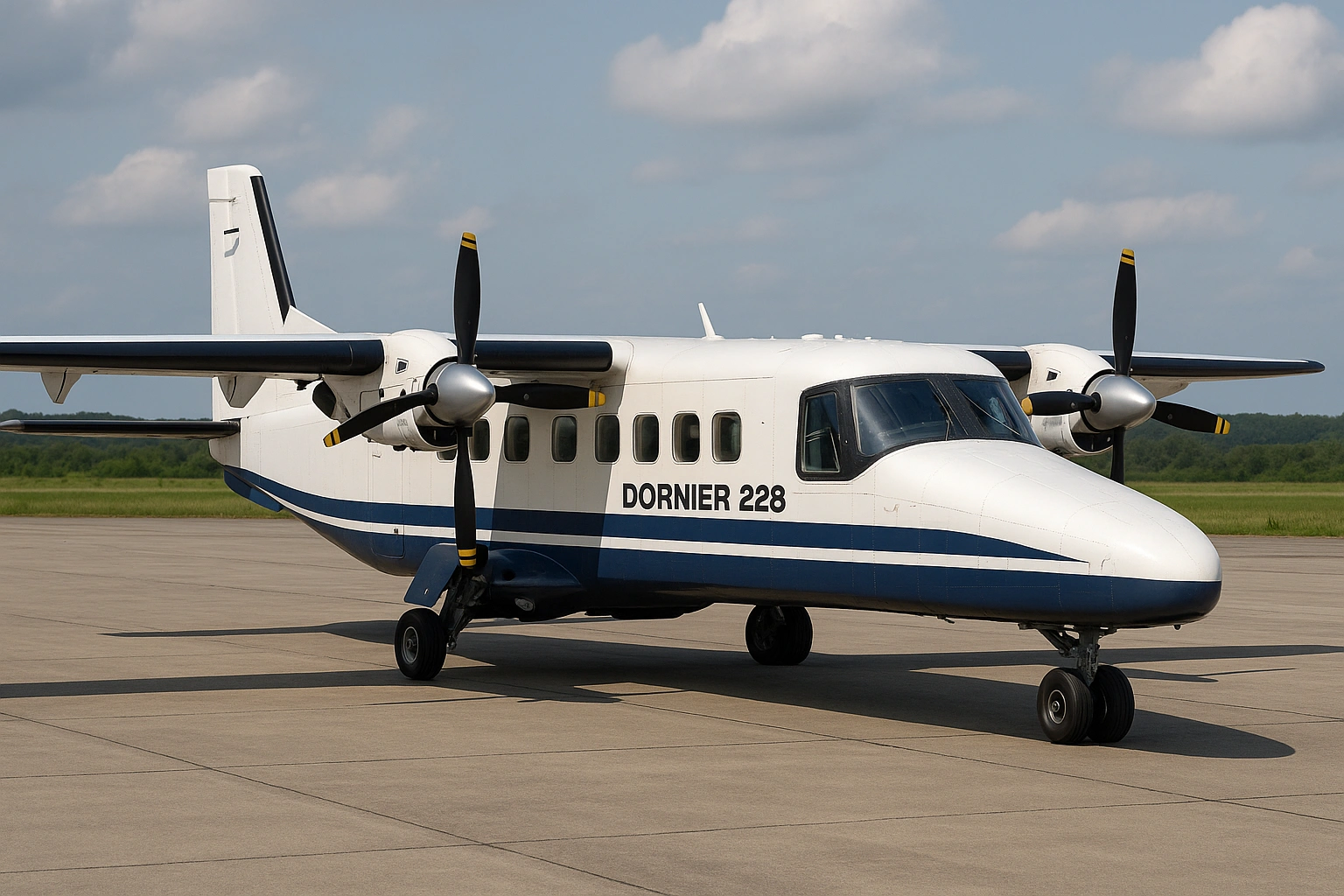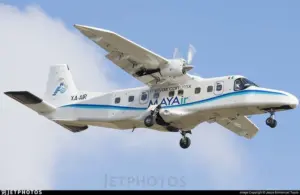📝 Introduction and Overview
The Dornier 228 is a versatile twin-engine turboprop aircraft designed for short takeoff and landing (STOL). It serves both civilian and military operations across the world. Developed in Germany and now produced by HAL in India, the aircraft is used for surveillance, cargo, passenger transport, and maritime patrol missions.
Table of Contents
Toggle| Feature | Details |
|---|---|
| Aircraft Type | Twin-engine turboprop |
| Role | Civil & military utility aircraft |
| Original Developer | Dornier GmbH (Germany) |
| Current Manufacturer | HAL (India) |
| First Flight | March 28, 1981 |
| Maximum Capacity | Up to 19 passengers |
| Key Strength | Short takeoff and landing (STOL) capability |
🔧 Technical Specifications
The Dornier 228 has strong technical features that allow it to operate in tough environments. It uses two Honeywell turboprop engines and has high wings for better visibility and lift. It’s known for fuel efficiency, good altitude performance, and quick operations on short and unprepared runways.
| Specification | Details |
|---|---|
| Engine Type | 2 × Honeywell TPE331-10 |
| Maximum Speed | 428 km/h (266 mph) |
| Range | 700–1,100 km |
| Service Ceiling | 25,000 ft (7,620 m) |
| Crew | 2 (pilot & co-pilot) |
| Passengers | Up to 19 |
| Takeoff Distance | Approx. 700 m |
✈️ Variants
The Dornier 228 has several variants, each with improvements in capacity, avionics, or mission roles. From the basic civil transport version to modernized military-grade aircraft, each model is tailored for specific requirements. The most advanced version is the Dornier 228NG with a digital cockpit and better systems.
| Variant | Description |
|---|---|
| Dornier 228-100 | Original model for civilian use |
| Dornier 228-200 | Enhanced fuel capacity and range |
| Dornier 228-201 | Improved avionics and performance |
| Dornier 228NG | Next-Generation version with glass cockpit |
🛠️ Manufacturing & Development
Initially built in Germany by Dornier GmbH, production later shifted to Hindustan Aeronautics Limited (HAL) in India. HAL has enhanced the design with newer technology for Indian needs. The aircraft is now built under license with modern equipment and is used by Indian defense and civil aviation sectors.
| Country | Manufacturer | Role |
|---|---|---|
| Germany | Dornier GmbH | Original design & development |
| Switzerland | RUAG | Acquired rights later |
| India | HAL | Licensed production & upgrades |
Read More : Voronezh Radar
🌍 Operational Uses
The Dornier 228 serves a variety of roles due to its multi-mission design. It is used in military operations, search and rescue, regional passenger flights, border surveillance, and cargo transportation. Its STOL capability makes it ideal for remote and difficult locations, especially in countries like India and Nepal.
| Use Type | Application |
|---|---|
| Military | Transport, training, surveillance |
| Maritime Patrol | Coastal security, naval operations |
| Civil Aviation | Short-haul passenger flights |
| Emergency Services | Disaster relief, medical evacuation |
| Cargo Transport | Supplies to remote regions |

🌐 Operators
Many countries operate the Dornier 228 for both civil and military purposes. Its affordable price, low maintenance, and versatility make it popular among small airlines, coast guards, and air forces. It is especially common in Asia and Africa due to its adaptability in rough terrains.
| Country | Operator |
|---|---|
| India | IAF, Navy, Coast Guard, HAL |
| Nepal | Agni Air |
| Bangladesh | Bangladesh Navy |
| Germany | Police & paramilitary units |
| Seychelles | Coast Guard |
| Maldives | Defense Force |
💡 Topics for Research or Discussion
The Dornier 228 opens discussion on local aircraft manufacturing, regional air services, dual-use aircraft (civil and military), and defense diplomacy. It’s also useful for studying sustainable aviation in small aircraft and improving air connectivity in isolated areas.
| Topic | Description |
|---|---|
| Local Manufacturing | Role of HAL in domestic aviation |
| Defense Exports | India gifting aircraft to neighbors |
| Regional Connectivity | UDAN scheme & Dornier 228 |
| Aircraft Versatility | Dual-use capability in one platform |
💰 Dornier 228 Price
The cost of the Dornier 228 varies depending on its configuration and purpose. Military variants are more expensive due to added equipment. However, the aircraft remains affordable compared to similar-sized models, making it attractive for smaller airlines and governments.
| Version | Approx. Price |
|---|---|
| Civilian | $6 million USD |
| Military | $7–7.5 million USD |
| Indian Market | ₹50–65 crore INR |
🛋️ Dornier 228 Interior
The Dornier 228 features a functional interior designed for utility. The passenger layout is simple with standard seating. It can also be converted for cargo or mission-specific tasks. It is not a luxury aircraft, but it offers space, comfort, and efficiency for its intended roles.
| Interior Feature | Description |
|---|---|
| Seating | Up to 19 basic passenger seats |
| Configuration | Passenger / Cargo / Surveillance |
| Cabin Size | Spacious for size class |
| Design | Utilitarian and durable |
🛩️ Dornier 228-201
The Dornier 228-201 is an upgraded version offering better avionics and systems compared to earlier models. It provides improved safety, navigation, and fuel performance, and is widely used by military and paramilitary forces for its advanced capabilities and reliability.
| Feature | Description |
|---|---|
| Role | Advanced utility and patrol |
| Avionics | Enhanced for better performance |
| Fuel Efficiency | Improved range and economy |
| Users | Military and government agencies |
⚠️ Agni Air Dornier 228 Crash
On August 24, 2010, a Dornier 228 operated by Agni Air crashed near Shikharpur, Nepal, shortly after takeoff from Kathmandu. The crash occurred due to poor weather and low visibility in the mountainous region. All 14 people on board were killed. The tragedy highlighted the risks of flying in difficult terrain and underscored the need for better navigation systems and weather forecasting tools for small regional airlines.
| Detail | Information |
|---|---|
| Date | August 24, 2010 |
| Operator | Agni Air, Nepal |
| Aircraft Type | Dornier 228 |
| Location | Shikharpur, Makwanpur District, Nepal |
| Fatalities | 14 (all on board) |
| Cause | Bad weather and poor visibility |
🇮🇳 HAL Dornier 228
HAL produces the Dornier 228 in India under license. The Indian version includes upgrades like glass cockpits and surveillance sensors. It’s used widely by the Indian Navy, Coast Guard, and Air Force and even supports India’s regional flight program under the UDAN scheme.
| Feature | Details |
|---|---|
| Manufacturer | Hindustan Aeronautics Limited |
| Capabilities | Civil, military, surveillance |
| Innovation | Avionics upgrade and localization |
| Clients | Indian defense and regional airlines |

💸 Dornier 228 Price in India
Due to local production, the Dornier 228 is priced competitively in India. Civil versions cost less than military ones, depending on customization. It is used for regional connectivity and military operations, offering a budget-friendly solution for air transport and surveillance.
| Configuration | Price Range (INR) |
|---|---|
| Civil Version | ₹50–55 crore |
| Military Version | ₹55–65 crore |
🌐 Which Country Received Two ‘dornier 228 planes’ from hal?
In 2022, Sri Lanka received two Dornier 228 aircraft from India, manufactured by Hindustan Aeronautics Limited (HAL). This move was part of a defense cooperation initiative aimed at enhancing Sri Lanka’s maritime surveillance capabilities. The aircraft are operated by the Sri Lanka Air Force for monitoring and securing coastal regions.
| Detail | Information |
|---|---|
| Country | Sri Lanka |
| Delivered By | HAL, India |
| Receiving Agency | Sri Lanka Air Force |
| Purpose | Maritime and coastal surveillance |
| Year of Delivery | 2022 |
Read More : Brahmos Missile
👥 Dornier 228 Seating Capacity
The Dornier 228 has a seating capacity of up to 19 passengers. The seating layout can vary based on the purpose—passenger, cargo, or special mission use. This capacity makes it suitable for short-haul regional and charter operations.
| Use Type | Seating Capacity |
|---|---|
| Passenger | Up to 19 |
| Cargo | Custom layout |
| Military | Mixed cargo and personnel |
🇮🇳 Dornier 228 IAF
The Indian Air Force uses the Dornier 228 for pilot training, light transport, and communication duties. Its reliability and ease of maintenance make it ideal for routine missions, while newer versions support modern navigation and mission systems.
| Use by IAF | Description |
|---|---|
| Training | Navigation and flight training |
| Transport | Troops and cargo movement |
| Surveillance | Coastal and border patrolling |
🧑✈️ Dornier 228 Cockpit
The cockpit of the Dornier 228 has evolved over the years. The newer NG versions come with a digital glass cockpit that provides modern navigation, weather data, and communication systems, improving safety and efficiency for both civil and military pilots.
| Feature | Description |
|---|---|
| Type | Analog (old), Glass cockpit (new) |
| Seats | Pilot and co-pilot |
| Controls | Dual controls |
| Displays | Digital screens in NG model |
📏 Dornier 228 Range
The range of the Dornier 228 varies by version and load but generally falls between 700 to 1,100 kilometers. This makes it ideal for regional operations, island transport, and maritime missions without the need for large airports or infrastructure.
| Model | Range (Approx.) |
|---|---|
| Dornier 228-100 | ~700 km |
| Dornier 228-201 | ~1,000–1,100 km |
| Dornier 228NG | ~1,100 km |
🔚 Conclusion
The Dornier 228 is a reliable, multi-role aircraft that plays a key role in civil aviation and defense. With local production by HAL and flexible design, it continues to serve India and several other countries effectively in various missions.
Read More : Pinaka Missile
Key Facts at a Glance
| Category | Details |
|---|---|
| Type | Utility aircraft |
| Manufacturer | Dornier GmbH, RUAG, General Atomics |
| Built by | Hindustan Aeronautics Limited (HAL) |
| Status | In service |
| Primary Users | Indian Air Force, Indian Coast Guard, Indian Navy |
| Number Built | Dornier: 245 HAL: 125 |
| Manufacturing History | Dornier: 1982–1997 HAL: 1985–present RUAG: 2010–2020 General Atomics: 2021–present |
| Introduction Date | July 1982 |
| First Flight | 28 March 1981 |
| Developed From | Dornier Do 28 |
❓ Frequently Asked Questions (FAQ)
Q1: What is the seating capacity of the Dornier 228?
A:
The Dornier 228 is designed to carry up to 19 passengers, in addition to 2 crew members (pilot and co-pilot). Its interior can be configured based on the mission — whether it’s for passenger transport, cargo, medical evacuation, or surveillance. The 19-seat layout makes it ideal for regional and charter flights, especially in areas where bigger aircraft cannot land due to runway limitations.
Q2: What is the range of the Dornier 228?
A:
The range of the Dornier 228 depends on the variant and load configuration:
-
The early versions (like the 228-100) have a range of around 700 km.
-
The upgraded 228-201 and Next-Generation (NG) versions can fly up to 1,100 km without refueling.
This range allows the Dornier 228 to be used for short-haul regional routes, coastal patrols, and island-hopping operations, especially in remote or rugged regions where large airports are not available.
Q3: Is the Dornier 228 still in production?
A:
Yes, the Dornier 228 is still in production, primarily by Hindustan Aeronautics Limited (HAL) in India. HAL manufactures upgraded versions of the aircraft under license, including the Dornier 228NG, which features:
-
A glass cockpit with digital avionics
-
Modern navigation and weather systems
-
Better fuel efficiency and performance
Read Also – Operation Sindoor

